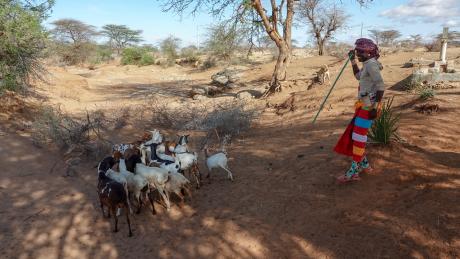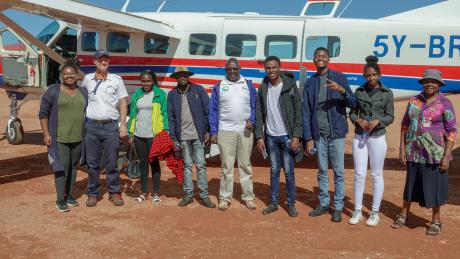
Animals, people, and children receive healing after holistic collaborations come together to address their physical, emotional, and spiritual needs.
A team of nine, including medical professionals, veterinarians, and evangelists, embarked on an MAF flight to reach a remote airstrip in Archers Post, Samburu County.
The flight proved invaluable, allowing us to arrive early, and providing ample time for community interaction and fellowship. We extend our gratitude to God for the safe flight and the expertise of the MAF pilot Daniel Loewen-Rudgers.
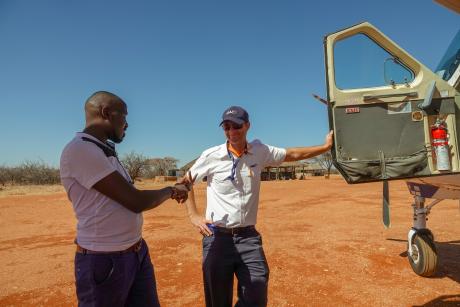
The Veterinary doctors attended to over 6,000 animals by the riverbanks of River Ewaso Nyiro, including camels, cattle, donkeys, goats, sheep, and dogs. They dewormed and gave metabolic stimulants and tended to various conditions.
Dr Jadiel Muiru, a dedicated veterinarian representing the Veterinarians with a Mission Program (VMP), joined the MAF flight. He remarked, "The flight from Nairobi to Kalama airstrip in Samburu was swift taking only one hour and fifty minutes, a stark contrast to the gruelling six-hour road journey it would have been."
He went on to share, "The flight proved invaluable, allowing us to arrive early, providing ample time for community interaction and fellowship. We extend our gratitude to God for the safe flight and the expertise of the MAF pilot Daniel Loewen-Rudgers."
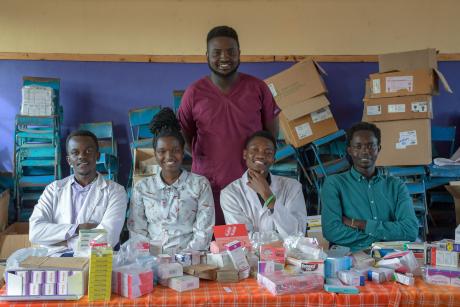
The medical team conducted screenings, diagnoses, and treatments, and provided nutritional counselling for more than 1,700 individuals.
Lenah Lepire, a resident of Archer's Post, wore a joyful smile as she expressed her gratitude following her treatment by the camp's doctors. She remarked, "I am delighted to receive free medical services and medications, which would have been inaccessible to us without financial means.”
Dr Samuel Njoroge, the leader of the medical camp, shared insights from his experiences, stating, “In Kenya, there continue to be unaddressed health issues, which is the reason why we have gathered here at Archer's Post today. Our primary objective is to share the message of Christ while providing healthcare assistance.
He highlighted the most common health issues observed during the medical camp, noting, "Throughout the camp, we've noted that the main health concerns in this area are respiratory tract infections, with an escalating occurrence of cataracts, showing a great need for eye health care."
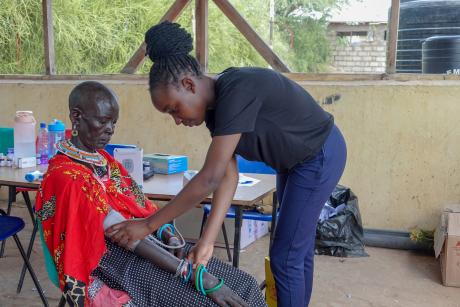
But it wasn’t just the physical health that received attention. As patients awaited their turn to be seen by the doctors, the evangelism team engaged patients in the waiting area and showed the Jesus Film during the medical camp, imparting the word of God to over 1,500 individuals. Their efforts led to over 60 people accepting Christ.
Christian Broadcasting Network (CBN) – Kenya actively engaged in the mission with a focus on ministering to the children. They effectively employed their interactive and easily comprehensible animated Bible series, Superbook, to captivate and educate young minds about the timeless teachings of the Scriptures. By using the holistic approach of medical and veterinary camps, the local missionaries had their hands full with the residents who turned largely to share in, the word of God.
Through the collaborative efforts of MAF, CITAM and CBN, Archers Post experienced a transformation that exceeded the physical and reached the depths of the human spirit, bringing healing and hope to all who call this remarkable place home.
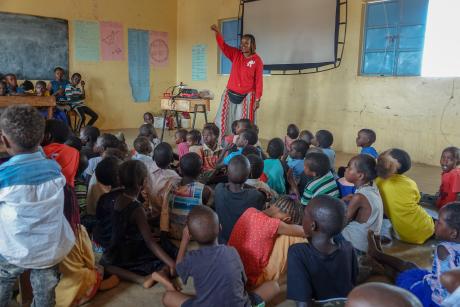
A Unique Case of Uterine Prolapse
Uterine prolapse is a medical condition characterized by the weakening of the muscles and tissues supporting the uterus, causing it to descend or protrude from its normal position.
Along the riverbanks of River Ewaso Nyiro, where a veterinary camp was in progress, a group of morans (young warriors) found themselves assisting a first-time kidding doe (goat giving birth). Unfortunately, the doe had not achieved full dilation during labour, resulting in the inadvertent pulling of the kid and subsequent uterine prolapse.
In a remarkable display of resourcefulness, Dr Maloba, aided by veterinary students Eric Gitonga and Sylvia Mambo, decided to employ an unconventional remedy. They used regular sugar, typically used for making tea, to help shrink the prolapsed uterus, making it easier to reposition. Once the uterus was carefully placed back in its normal position, they secured it with nylon sutures on the vulva to prevent a recurrence of the prolapse. To aid in the healing process, the team administered anti-inflammatory and anti-bacterial medications.
The procedure proved successful, and by the conclusion of the camp, the veterinary team assessed and reported that the doe was on the path to a full recovery.
